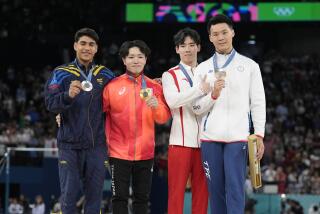Asian Games Analysis / Randy Harvey : South Koreans Intent on Keeping Their Guard Up
- Share via
SEOUL, South Korea — The two reporters sitting to my left at the opening ceremony of the Asian Games last weekend were from the New York Times and the Baltimore Sun. I knew they weren’t sportswriters because they were talking about baseball. Their ties gave them away, too. They were wearing them.
Assuming they were foreign correspondents from their newspapers’ Tokyo bureaus, I asked why they were sent to Seoul for the Asian Games. I didn’t figure it was to see Kuwait play Bangladesh in soccer.
“We’re here to cover bombings,” one of them said.
He laughed, but I knew he wasn’t kidding. I excused myself to watch the rest of the ceremony from the shelter of the press center underneath the Olympic Stadium. The closest I want to get to bombs is at a Jets-Dolphins game.
Fortunately, The Times has Sam Jameson of the Tokyo bureau here to cover bombings and other events of interest to the foreign desk. He already has covered one bombing, Sept. 14 at Kimpo International Airport. Five people were killed and more than 30 injured.
The South Koreans reflexively blamed the North Koreans, although there is no evidence to support the allegation. North Korea has denied involvement.
An American businessman who lives in Seoul said he arrived at the airport two hours after the explosion, and, unaware of the bombing, asked about the construction outside of the main terminal. He said he was told by security guards that it was a last-minute renovation before the Asian Games. It wasn’t until the next morning that he learned of the incident.
By the time I arrived at Kimpo two days later, there was no evidence of a disturbance.
That does not mean that because the destruction is out of sight, it is out of mind.
When I congratulated Chyun Sang Jin, a member of the general assembly of the Seoul Olympic Organizing Committee (SLOOC), last week on the preparations for these games, he shook his head sadly and said, “Except for the tragedy at the airport.”’
Chyun said the bomb exploded inside one of the trash cans, which were being inspected hourly by security guards.
“We suspect someone placed the bomb immediately after one of the security checks,” Chyun said. “So we think it was someone who had knowledge of the security system, someone on the inside.”
In order to assure that trash cans are clean for the remainder of the Asian Games, Chyun said they now are being watched around the clock.
Well, why not? Nothing else appears to have escaped the omnipresent eye of Korean security.
There are guards in restaurants, guards on hotel floors, even guards at department store escalators.
A conservative estimate is that security personnel for the Asian Games numbers 200,000, including police, military and intelligence forces. There are so many guards that they have been seen checking each other.
“I don’t want this to sound wrong because of the loss of life and the injuries involved, but the bombing might have been fortunate for Korea,” said Cho Dong Won, resident auditor of the Korea Economic Daily.
“The government talked about a threat before, but it took this to make everyone realize how serious it was. A few weeks ago, people here would have been irritated by all of the security. Everyone knows now that it is necessary.”
South Korean citizens had an excuse for their complacency since no terrorism of this magnitude had occurred since 1982. Even though Seoul is less than an hour from the North Korean border, SLOOC officials used the country’s excellent security record as a selling point in winning the 1988 Summer Olympic bid from the International Olympic Committee.
Just the same, there never has been a peaceful transition of presidential power since the establishment of the republic 38 years ago, and university students here seem to demonstrate every time the class bell rings.
One might have thought IOC members, many of whom were in Seoul last week for executive board meetings, would have second thoughts in light of the bombing, but IOC President Juan Antonio Samaranch treated it as just another day at the office.
Since the murder of Israeli athletes at the 1972 Munich Olympics, the IOC has accepted terrorism as an unfortunate part of life.
Paris, one of the leading candidates to host the 1992 Summer Games, has had 11 terrorist bombings since December. Yet, Samaranch said during a press conference that the incidents will not affect Paris’ chances in the voting next month in Lausanne, Switzerland.
At least the security guards here are polite. They say please and thank you, and don’t point with their guns, unlike the young--teen-age young--soldiers at the 1983 Pan American Games in Caracas, Venezuela, who showed their hardware to the most innocent of provocateurs.
For instance, when one reporter, who shall remain unidentified, put his feet on the chair in front of him at a basketball game, a soldier waved at the villain to move them. The order was extremely effective because the soldier waved with his submachine gun.
If that’s the worst it gets here, he’ll consider himself fortunate.
A sample of last weekend’s headlines:
“Japanese Athletic Team Placed Under Special Protection.”
“Probe Team Asks for Interpol Aid in Bombing Case.”
“Dissident Leaders Protest Against Nakasone Visit.”
“North Korea Shooting in DMZ Aimed at Heightening Tensions in South.”
“Police to Arrest Any Protesters Attempting Advances to Stadiums.”
That’s the sports news.
Now for the weather.
In the Asian Games competition Tuesday, Li Ning, the World Cup and Olympic star, won the men’s all-round gymnastics gold medal as China completed a 1-2-3 sweep in the men’s and women’s events.
Chen Cuiting, 15, took the women’s gold medal.
Japan, which has been counting on its swimmers to stay in contention, had a disappointing day, winning only two of five races. But all five were won in Games-record times, bringing to 13 the total number of Games records in 14 swimming events so far.
Japan’s Katsunori Fujiwara became the Games’ first triple gold medalist. He won the men’s 100-meter freestyle after earlier victories in the 200-meter freestyle and the 800-meter freestyle relay.
China leads the medal standings with 19 golds, 17 silvers and 11 bronzes. Japan had 14 golds, 12 silvers and 13 bronzes, and South Korea 8 golds, 9 silvers and 8 bronzes.
More to Read
Go beyond the scoreboard
Get the latest on L.A.'s teams in the daily Sports Report newsletter.
You may occasionally receive promotional content from the Los Angeles Times.






